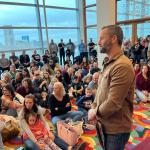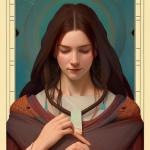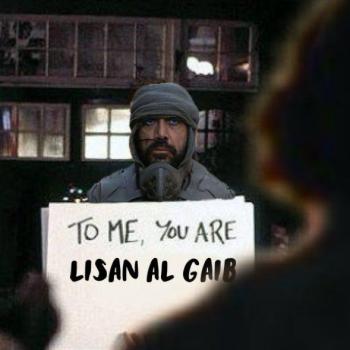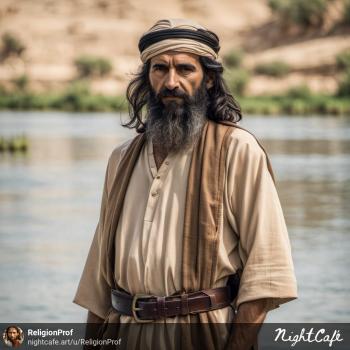Call for Abstracts [via Matt Brake]: Theology, Religion, and Dungeons & Dragons
Edited by Scott Donahue-Martens and Brandon Simonson
Dungeons & Dragons is a tabletop role-playing game (TTRPG) that was created in 1974 and popularized in the 1970’s and 1980’s, though it has found a renaissance in contemporary popular culture due in part to its prominent role in the Netflix series Stranger Things. The COVID-19 pandemic saw a surge in virtual Dungeons & Dragons (D&D) gaming via work-from-home platforms such as Zoom; from their living rooms, people across the world would work in the virtual office by day and venture into the fantasy worlds of D&D by evening. Additionally, the rising popularity of live-streamers and groups with enormous followings, such as Critical Role, underscores the prominent role that the game continues to hold with tabletop gamers and speaks to the diverse manners in which D&D is enjoyed.
The fantasy worlds of D&D are replete with religious imagery and rely on the theological imagination. Real-world theological and religious concepts and ideas inform this theological imagination, placing human players in foreign yet familiar settings. Guidebooks provide source material for religious and belief structures, as well as deities and player classes that engage both religion and theology. D&D utilizes theology and religion in its expansive mythos, worldbuilding, and everyday experiences of adventures.
The editors gladly invite submissions on, but not limited to, the topics below for a volume on the intersections of academic disciplines of theology, religious studies, and the creative world of Dungeons & Dragons (D&D), to be published in the Theology, Religion, and Popular Culture book series. Interested authors should send chapter abstracts of 300-700 words, along with a CV or resume, to [email protected].
Methodologies and Approaches: theological, religious, or other disciplines intersecting with some aspect or concepts from the D&D universe. Topics might include:
- The relationship between theology and role-play for spiritual formation.
- Pastoral theology: D&D and spiritual care.
- The three-tiered universe, the sacred canopy, and postmodern epistemology.
- Gaming or games as spiritual or religious practice.
- The collaborative roles of the Dungeon Master and players, the roles of clergy and laity.
- The place of ritual and spellcasting, the place of liturgy and sacrament.
- Diverse theological systems, henotheism, polytheism, etc. and D&D pantheons.
- Mythology and formation: understanding the structuring role of narrative.
- Existentialism, adventuring, and the quest for meaningful living.
Themes: theological and/or religious explorations of major themes related to the D&D universe. Topics might include:
- Mainstream acceptance, how popular culture contributed to shifting public perceptions of D&D.
- Race (now changed to species), class, gender, and other revisions in the D&D universe.
- The commodification of hobbies, capitalism and D&D.
- Fantasy/Tolkien’s influence on D&D.
- Can good people play evil characters?
- Theological or religious tolerance and pluralism amid competing complex belief structures.
- The lingering impact of past-trauma in characters’ backstories and the enactment of woundedness. The death of an imagined character and loss.
- Interaction between human and non-human (“others”).
- Non-combative conflict transformation.
- Are the dice gods mad at me, determinism and free-will?
- Good versus evil, are devils beyond redemption?
- Friendship, companionship, and mental health.
- Vocation/Calling and teamwork: multiclassing outside of traditional boxes.
Works: Topics might include:
- Stranger Things and Christian fear of D&D.
- An analysis of part of some aspect of a prominent campaign or popular culture portrayal of D&D (like Critical Role, the “C” Team, or Onward).
- Media portrayal of D&D, or stereotypes of table-top gamers and bullying, exclusion, or escapism.
- An analysis of a major D&D campaign like Tomb of Annihilation, Lost Mine of Phandelver, Storm King’s Thunder, etc.
- Engagement with the fantasy books set in the D&D universe like The Legend of Drizzt.
- Baldur’s Gate: online RPG in the D&D universe
The call for chapters ends February 15, 2023. Authors will be notified of accepted proposals on March 1st, 2023. Authors will submit their accepted chapters by August 31st, 2023. Final chapters with revisions will be due March 1st, 2024 with an anticipated publication date honoring the upcoming 50th anniversary of D&D.
The editors ask that all contributors engage with the existing academic literature on D&D. While the editors will not prescribe particular sources or methodologies, proposals should reflect acquaintance with current scholarship on D&D and final drafts are expected to engage with this scholarship. In other words, we expect each chapter to critically engage D&D along with other scholars.
Scott Donahue-Martens is a Ph.D. candidate at Boston University School of Theology. He studies the narrative phenomenology of Paul Ricoeur, especially as it relates to homiletics and hermeneutics. He holds a Master of Sacred Theology from Boston University School of Theology and a Master of Divinity from Princeton Theological Seminary.
Brandon Simonson holds a Ph.D. in Religious Studies from Boston University. Dr. Simonson is currently an Instructor of Biblical Studies at Boston University School of Theology and an adjunct lecturer in the Department of Religious and Theological Studies at Merrimack College. He frequently employs popular culture, music, and literature in his undergraduate Religious Studies pedagogy.
Donahue-Martens and Simonson co-edited the book Theology, Religion, and Dystopia, which was published in the Theology, Religion, and Pop Culture series by Lexington Books and Fortress Academic in October 2022.













